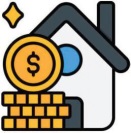WRITING IEP GOALS FOR FUNCTIONAL MONEY SKILLS AT ANY AGE

BY STEPHANIE DELUSSEY
IEP. Three little letters that pack a lot of punch for families of school-aged children with disabilities, who qualify and attend public schools. IEP. Individualized Education Program.
In a small nutshell, an IEP is designed for each child with a disability to help them learn alongside their same-aged peers with appropriate accommodations, modifications, and adaptations. Although those words (appropriate accommodations, modifications, and adaptations) are very important, we aren't going to be talking about those words today. There is one other huge piece of every IEP that really can help a child with their "further education, employment, and independent living" – and that's IEP goals.
IEP goals are written to help a student achieve and master new skills. But IEP goals do not and should not be only academic in nature.
This month we will be talking about IEP goals that align with money. Money skills are important, and your child's peers begin learning what money is and how to count, add and subtract money early in elementary school. But using money and your child's money IEP goals, should be so much more than knowing what money is and how to count coins.
So, what money skills can a child's IEP goals practice and build on that aren't "Jaxon will identify coins" or "Zoie will count coins up to $1"? Let's take a look at four skills every student needs to know for independence.

1. PLANNING + BUDGETING
It's one thing to make and have money, and it's another thing to plan out your bills and budget the money in your bank account. Skills that fall under planning and budgeting:
- Do I have enough money to pay for (insert want, need, or service)?
- How much money will I have left?
- How much money will it cost to pay for (insert want, need, or service)?
- Can I find this (item) somewhere cheaper?
- Do I really need this item, or can I buy a similar item for less money?
Planning and budgeting also fit well into having a conversation about wants and needs.